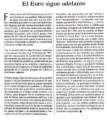
 |
|
|
TABLE OF CONTENTS
|
||
|
|
2. Blank models4. Activités du Département de Français5. Mathematical Photography Contest INTRODUCTION TO HUMANITIES
Why did I decide to carry on this project? One of the reasons for carrying out this project was to introduce pupils a foreign language in different contexts and for different purposes. They have to use a foreign language (English for example) to use English to study subjects like History or Science or Maths, and that is much more stimulating and encouraging. Another reason is that this kind or project will motivate and make learners much more autonomous. Pupils use the language to communicate things they really like and need to, so the language they use is much more "real". Encouraging pupils to create (elaborate) articles, poems, narrating about subjects they are really interested in helping students to use the language they study during the Foreign language lessons and broadens the communicative skills much as writing, speaking, listening and understanding. The fourth reason for carrying the project out is that the progress you develop when you are learning a language is not always the same. For example at the beginning of your learning, the student has the feeling he's learning a lot, while you reach an intermediate level you have the feeling you are learning very little. So elaborating a magazine can create enough motivation to overcome that problem. The fact that pupils from other countries could also read their material, challenge pupils to continue their learning process. As I've said previously, students have the opportunity to use the skills of the language they have learned, in a new and different way, more real and challenging. And the student also has the chance to become conscious what he/she has already learnt and what he/she will go on learning will be useful for him/her. And not only that, the pupil will also become conscious that he/she is able to use a Foreign language, although it may have been difficult for him/her to learn it. METHODOLOGY I follow a methodology quite centred on the pupil's effort, work, since it is the pupil who takes an active part in his/her own learning. Pupils should be responsible for what they learn. They choose the subject they like most and the teacher becomes a consultant. As a consequence, the language is not only learned through teacher's motivation, but also because of the pupils' need to use it. Learner's autonomy would be developed: - Aims negotiation - Self-correction - Self-learning tasks - Activities for self-evaluating - Writing a diary (this is optional, some pupils don't like it) We will use different texts to comment upon. We will use texts from encyclopaedias, magazines, different kinds of textbooks. We will use simulations, role-plays and interviews, Internet WEB pages in order to write texts. Pupils will also make use of language labs, computers in order to edit the magazine. AIMS 1. Learn vocabulary and new grammar structures in a "meaningful" context: a play, a scientific text, poems, novels, narrating, newspapers and magazine articles, advertisements. 2. Being able to speak aloud in front of people. 3. Improving oral output thanks to "paralinguistic" sources: timbre, pitch of voice (tone), intonation, rhythm and intensity. 4. Learning to write for other people. 5. Using foreign languages in the classroom. 6. Acquiring skills to develop memory. 7. Understanding different texts and audio-visual material. 8. Using writing as a tool to communicate ideas. 9. Being aware of the improvement achieved in learning a foreign language. 10. Learning to communicate with the help of new technology: computers, tape-recorders, etc. 11. Learning to classify the material selected to elaborate the magazine. 12. Learning to use grammar books, dictionaries, encyclopaedia, index, catalogues, in an appropriate and frequently used way. 13. Learning to co-operate in pairs or groups, owing to the fact that everybody is different. 14. Developing responsibility in a group project. 15. Learning to self-evaluate.
Syllabus of means (process) 1. Analysing different texts in order to be able to create similar ones. 2. Acquiring means (skills) to improve writing due to learning punctuation, the use of connectors and links. 3. Analysing the structure of a text. 4. Ordering material in a previously agreed way. 5. Knowing how to summarise written ideas. 6. Deducing meaning of words of unknown words from our previous knowledge, context, body language and so on. 7. Organising a text (structure of the text in paragraphs, punctuation, pronouns, connectors) 8. Structuring the paragraph: connecting sentences and writing them in a coherent way. 9. Using punctuation and other language conventions (capital letters...) to achieve coherent and understandable texts. 10. To manipulate and summarise texts. 11. Producing texts following model-guides. 12. Describing. 13. Narrating. 14. Techniques and skills to write freely and creatively (without any guide, model). 15. Using techniques of multisensory learning: sights (cinema, cartoons, pictures), music. 16. Reading aloud. 17. Reciting. 18. Speeches. 19. Singing songs. 20. Simulations. 21. Using role-play.
The aim of writing articles for a magazine and sharing it worldwide was to motivate students to write in English. In this section you will find different kinds of articles: Opinion about books, films or any other or any other subjects, about personal experiences, some cartoons, a survey about Sunday habits, poems, puzzles, quizzes, crosswords, and history of art. If you look at the section of the magazine you will read about all these articles our pupils wrote. As we are interested not only in you reading our magazine, but we’d also like you to write articles about the same subjects we wrote (or other subjects if you prefer). You can send them to us, we have prepared task sheets for giving you a guidance of the process we followed in order to write those articles. Please write in those task sheets. _______________________________________________________ |
|